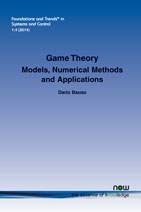Game Theory: Models, Numerical Methods and Applications
By Dario Bauso, Dipartimento di Ingegneria Chimica, Gestionale, Informatica e Meccanica, Universita di Palermo, Italy, dario.bauso@unipa.it
Abstract
Game theory is the theory of strategic thinking. Developed for military purposes and defense, in the past it has also been used as an alternative and complementary approach to deal with robustness in the presence of worst-case uncertainties or disturbances in many areas such as economics, engineering, computer science, just to name a few. However, game theory is recently gaining ground in systems and control engineering, mostly in engineered systems involving humans, where there is a trend to use game theoretic tools to design protocols that will provide incentives for people to cooperate. For instance, scientists tend to use game theoretic tools to design optimal traffic flows, or predicting or avoiding blackouts in power networks or congestion in cyber-physical networked controlled systems. Incentives to cooperate are also crucial in dynamic resource allocation, multi-agent systems and social models (including social and economic networks). This paper assembles the material of two graduate courses given at the Department of Engineering of the University of Oxford in June-July 2013 and at the Department of Electrical and Electronic Engineering of Imperial College, in October-December 2013. The paper covers the foundations of the theory of noncooperative and cooperative games, both static and dynamic. It also highlights new trends in cooperative differential games, learning, approachability (games with vector payoffs) and mean-field games (large number of homogeneous players). The course emphasizes theoretical foundations, mathematical tools, modeling, and equilibrium notions in different environments.
Game Theory
This monograph provides the reader with a comprehensive overview of game theory covering the foundations of the theory of noncooperative and cooperative games, both static and dynamic. It also highlights new trends in cooperative differential games, learning, approachability (games with vector payoffs) and mean-field games (large number of homogeneous players). Based on courses given at the University of Oxford and Imperial College London, this work emphasizes theoretical foundations, mathematical tools, modeling, and equilibrium notions in different environments.
The author uses a tutorial style to illustrate the major points so that the reader can quickly grasp the basics of each concept. The comprehensive reference list enables further research. This is the first tutorial to give such a concise and accessible introduction to the subject. It will be of use to all students, practitioners, and researchers looking to understand the basic concepts, models, and applications of game theory.
